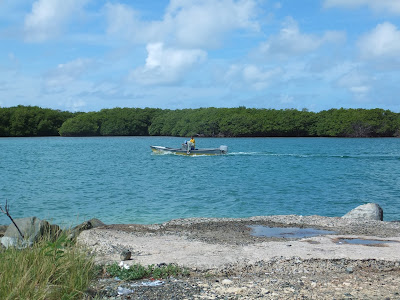 |
| Christiansted |
Have you ever donated your time to
helping scientists collect data? No, well here are a few citizen
scientist projects that we in the Virgin Islands or in fact anywhere can participate in.
The Annual Christmas Bird Count
has been going on continuously for over 100 years and takes place all
over North America, Central America, the Caribbean and parts of South
America. Volunteers dedicate one day out of the year to collect
information on bird species and numbers observed. Teams go out and
cover specific areas in order to reduce overlap but anyone can
participate even those who just want to count the birds congregating
in their back yards or around their feeders. All the data collected
is compiled by regional directors and put onto the website for anyone
to search. This year the count will happen December 15 and there should be notices in the newspaper about how to volunteer.
 |
| Domino players at Cramer Park |
Shark Count is
a project that is collecting data from people who are either diving
or snorkeling or swimming in open water and encounter a shark. The
information collected will be used to help protect the sharks and
provide more information about the populations and their density. To
find out more about this program and to sign up go to
https://www.sharksavers.org/en/our-programs/sharkscount/
 |
| A view of Buck Island from shore |
Marine Debris Tracker NOAA
has a program and an app that you can add to your phone to track
garbage that floats on to shore or that you see in the water. Garbage
in our waters is a global problem that affects everything from navigation, to fish, to birds caught in nets and mono-filament and
even to our economy. Right now it is Coastal Clean up week and teams
have been out all over the island collecting garbage off our
beautiful beaches. Just noticing that there is garbage is the first
step in eradicating it. If you would like to get involved in helping
out and to get the app go to
http://marinedebris.noaa.gov/projects/seamdi.html
 |
| Cramer Park beach |
Here's
a fun one that takes just a few minutes
Test your Quarter apparently
not all quarters are created equally. Now that states are allowed to
mint their own there has been some controversy concerning the
fairness of a quarter. If you toss one in the air it should land
heads up just as often as it lands tails up. These guys want you to
test your quarters and report the findings to them after learning
what they are all about
http://physicsbuzz.physicscentral.com/2013/08/citizen-science-testing-fairness-of-us.html
 |
| View from the top of Blue Mountain...very hazy day. |
and
this one anyone who lives on this island can do
National Cockroach Program all
you have to do is collect, label, and send in all those dead ones you
find laying about. Amazingly people do study cockroach's as they can
reveal a lot about evolution and migration. Did you know that
American cockroach's hitchhiked here from Africa? Check it out
 |
| Rescued baby Mongoose |
Caribbean Lionfish Response Program
all it takes to be a lionfish
spotter is to carry around a marker that consists of a length of
orange flagging attached at one end to a metal washer and at the
other end to a cork. If you see a lionfish drop the marker and
contact Fish and Wildlife or any of the local dive shops.
 |
| Cramer Park |
There
are tons of other projects going on around the world and you might be
able to locate some in your area...just google “citizen science”
and explore the possibilities.
See
ya next week.



























